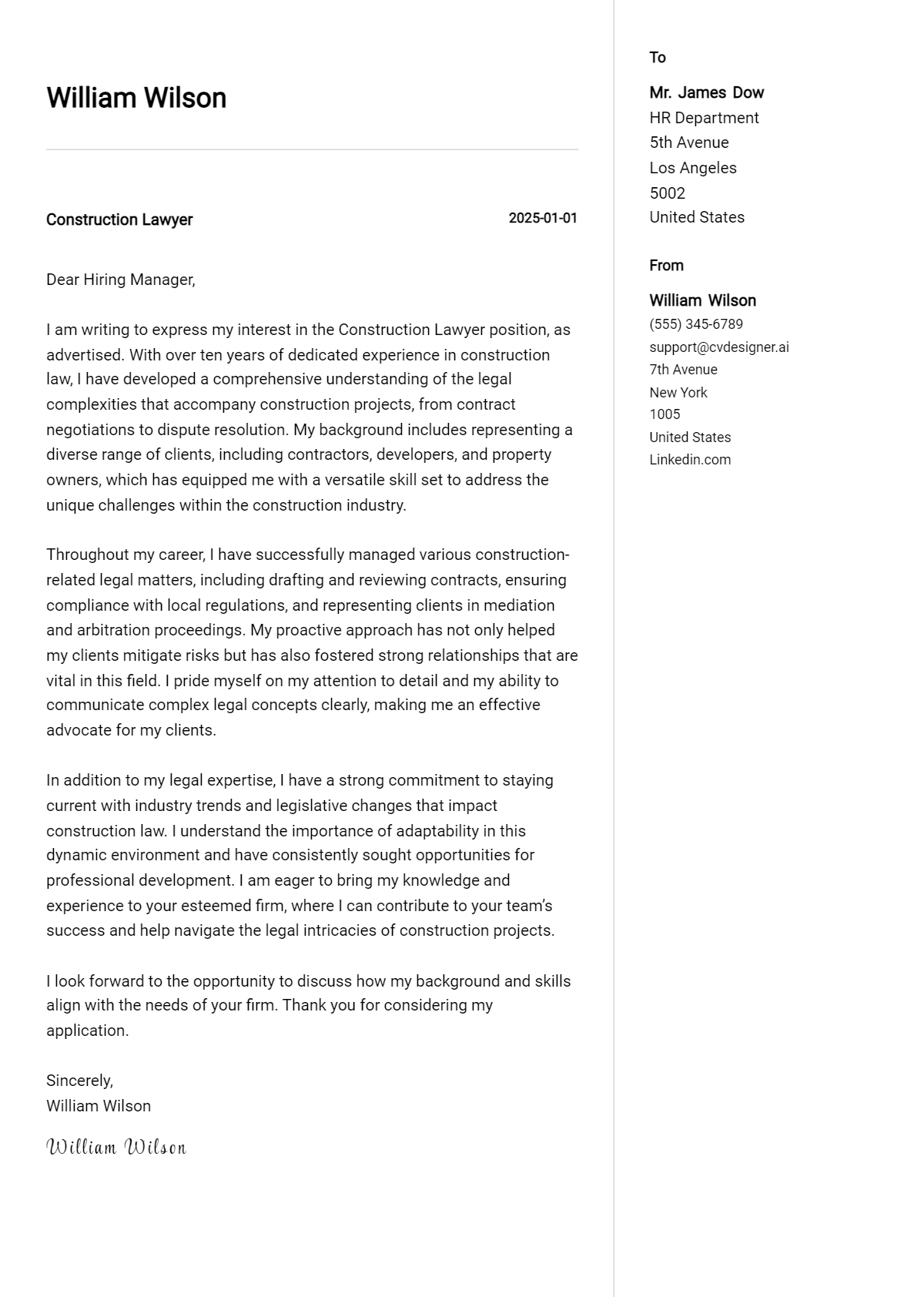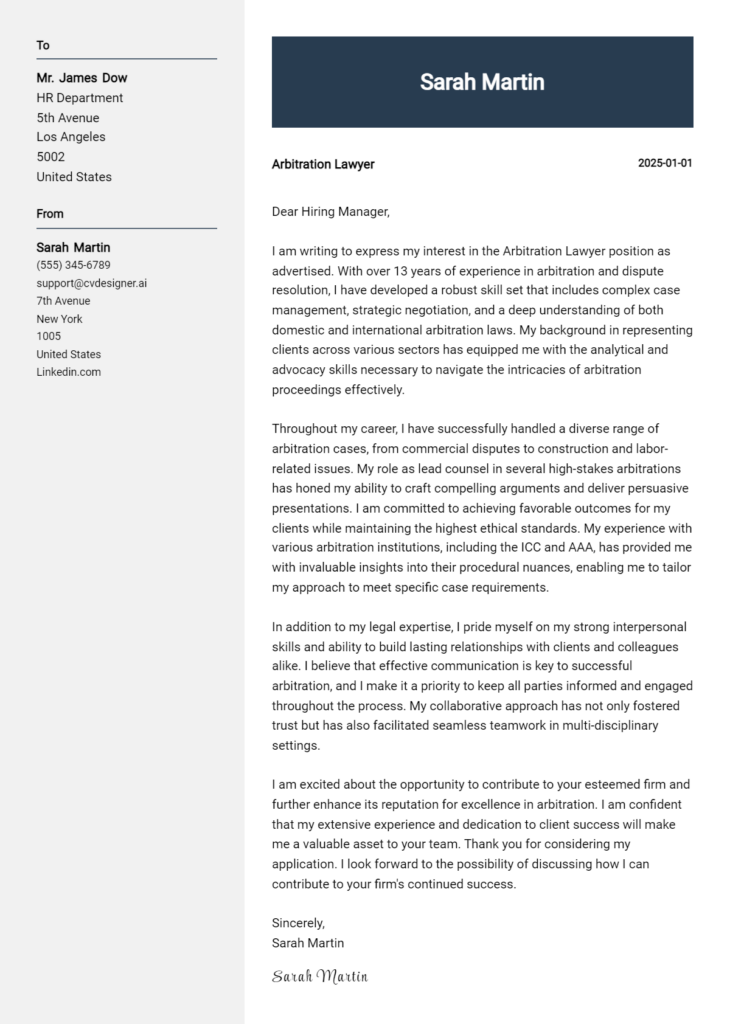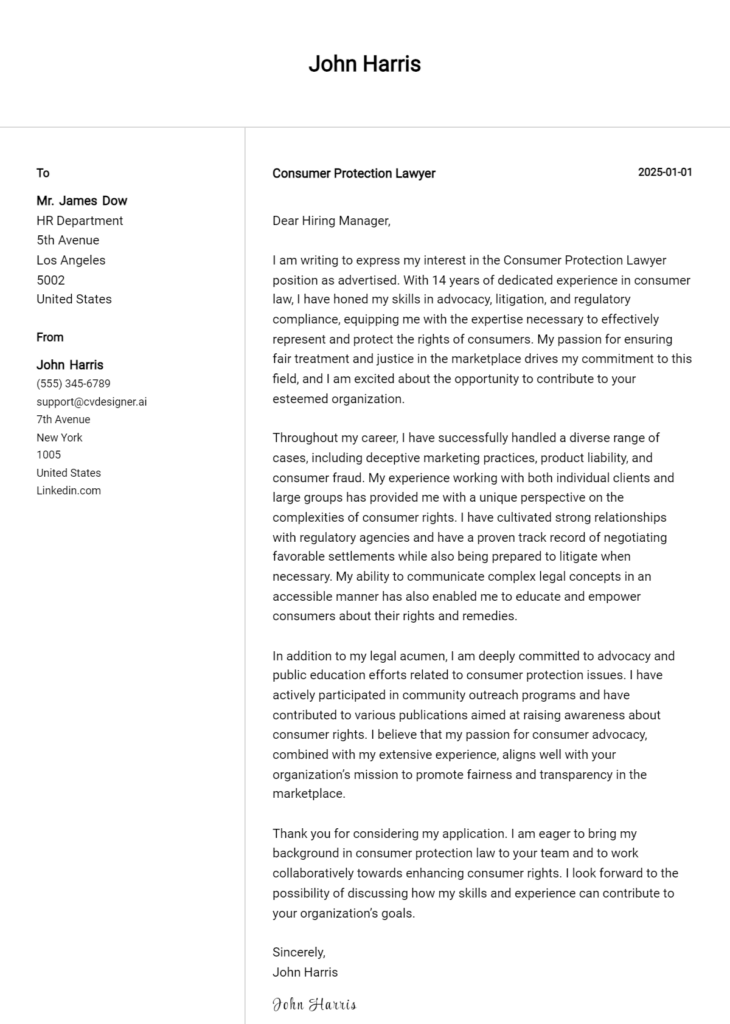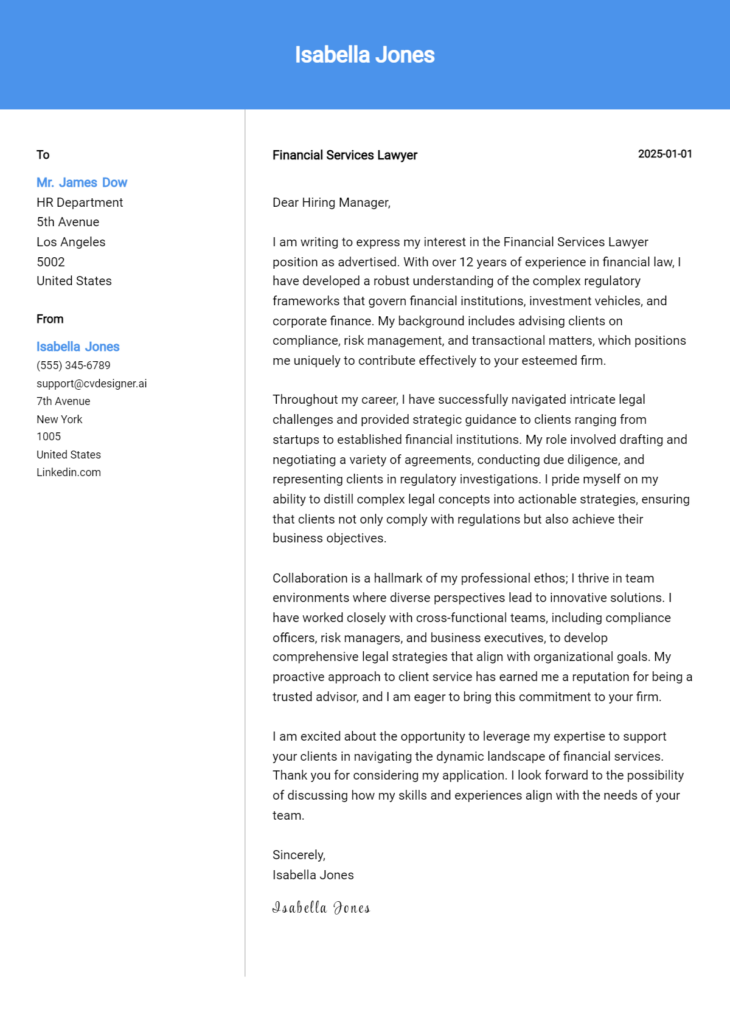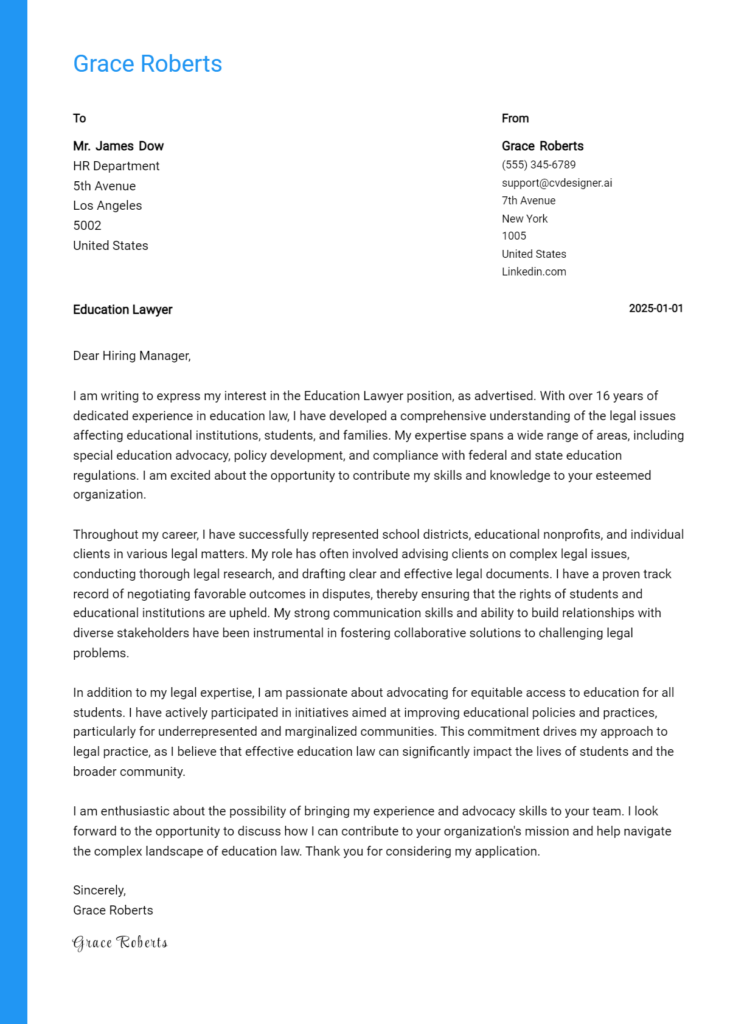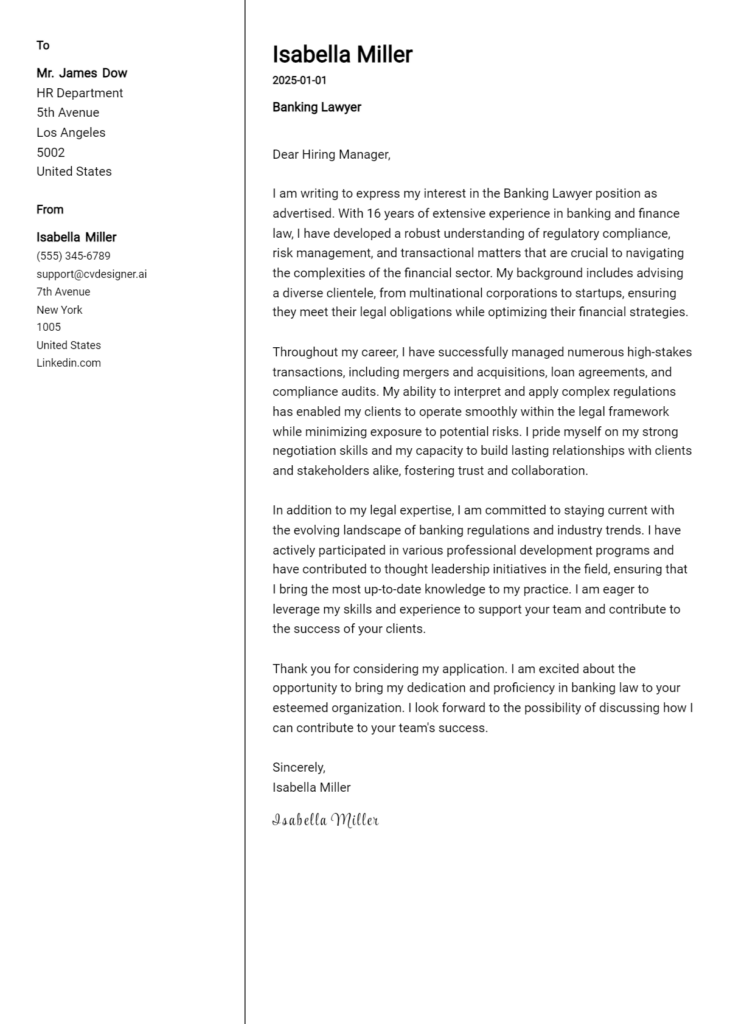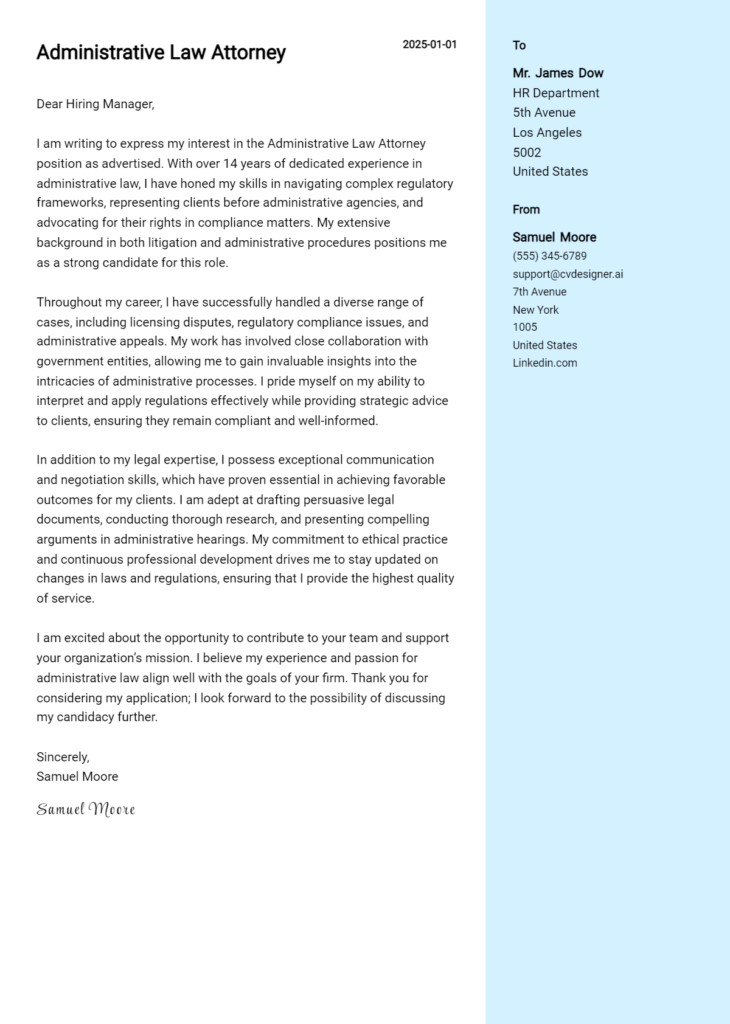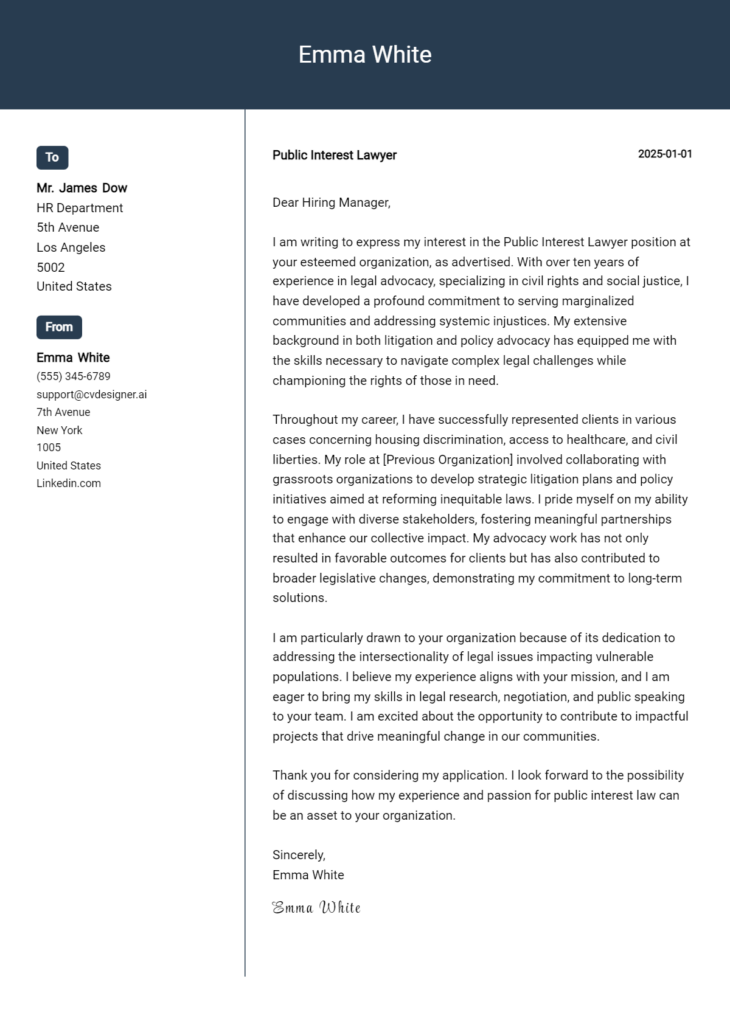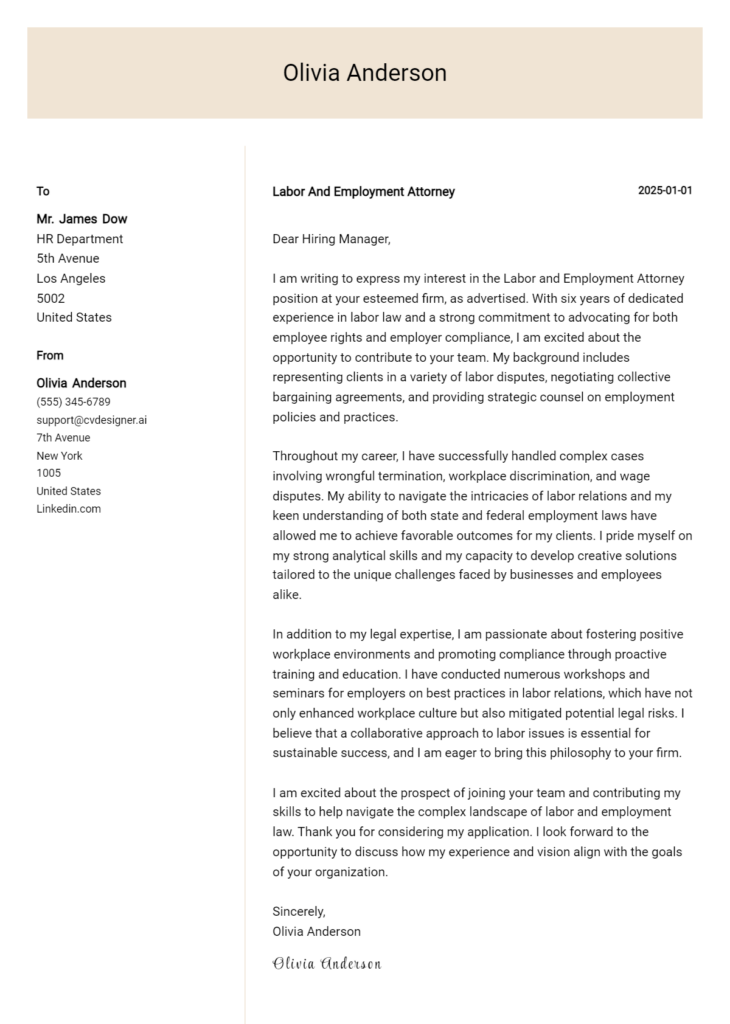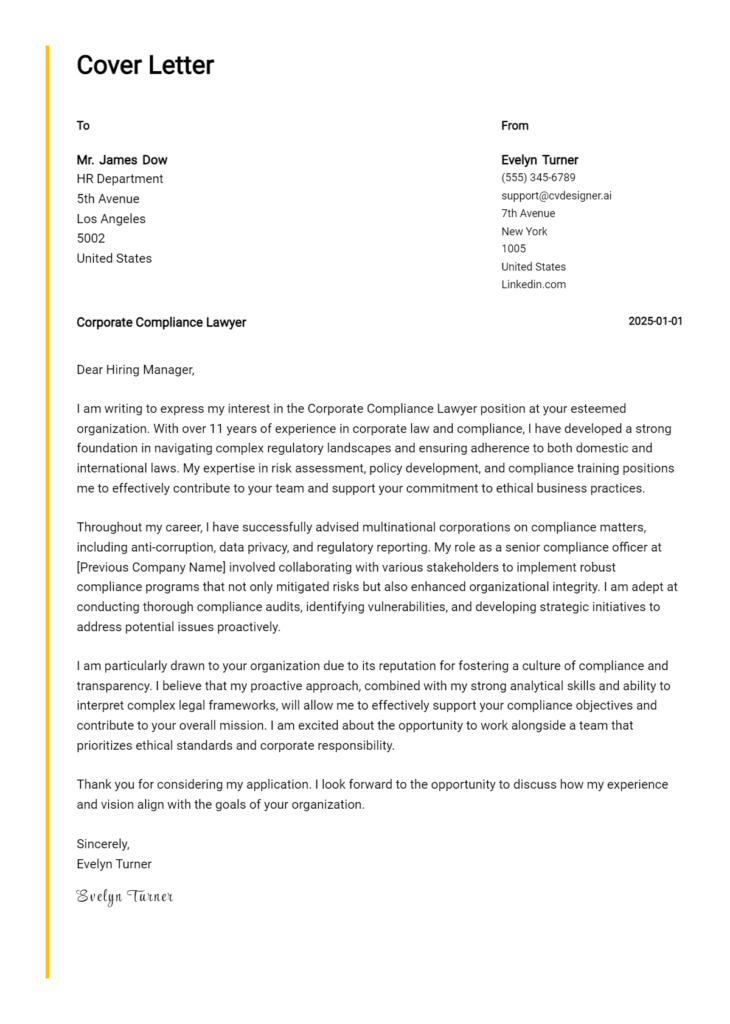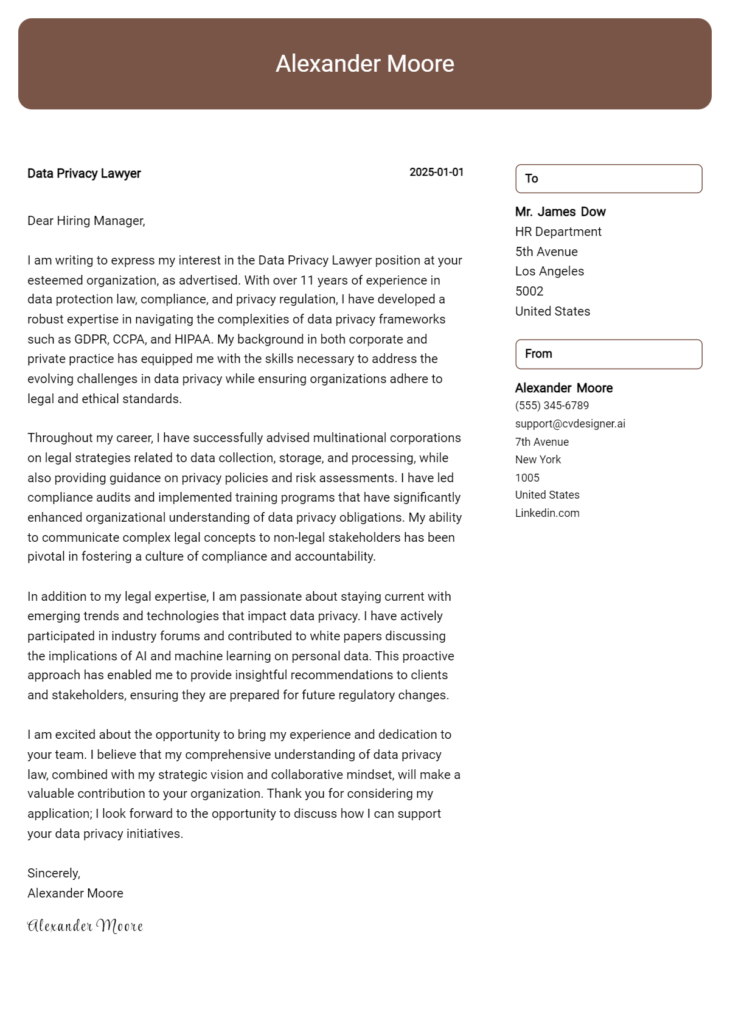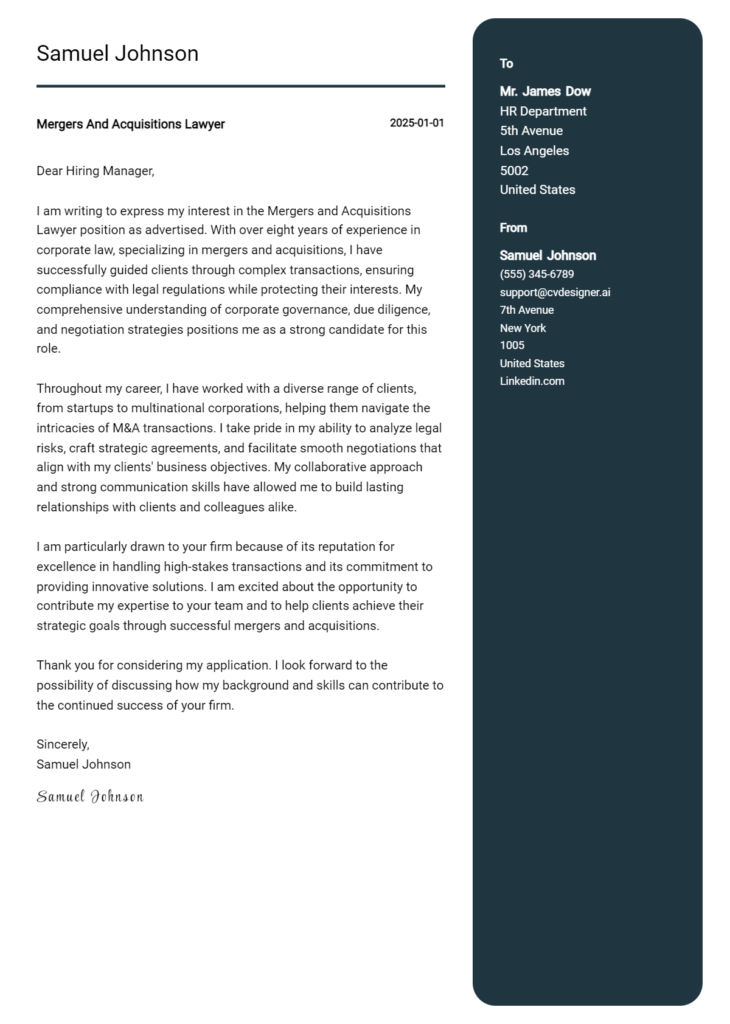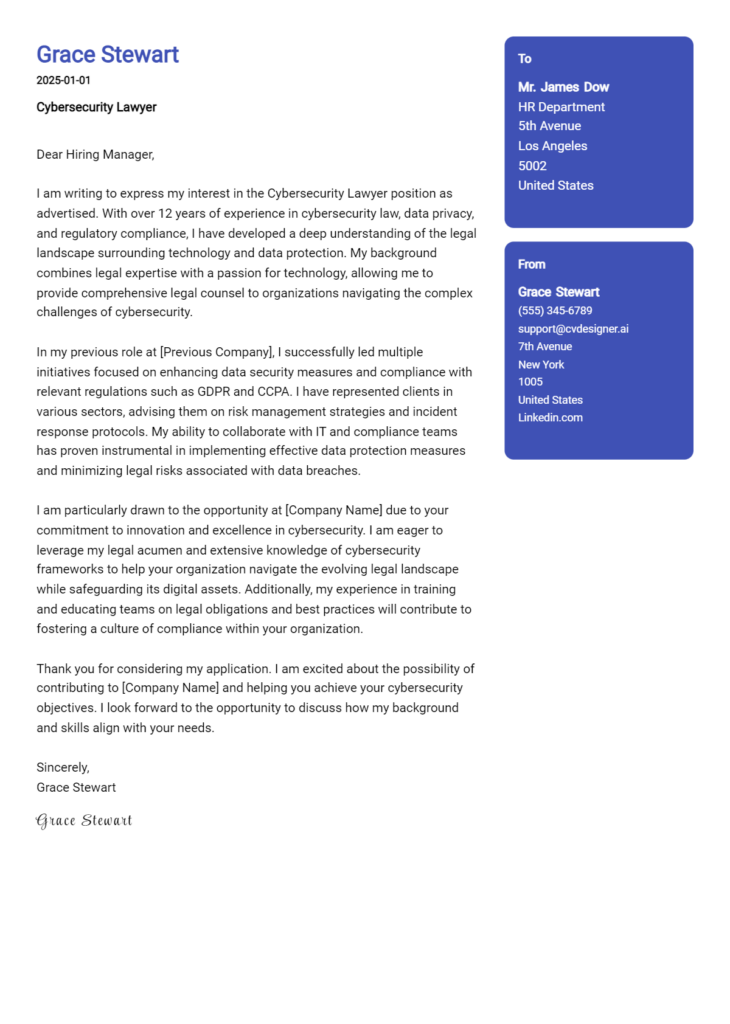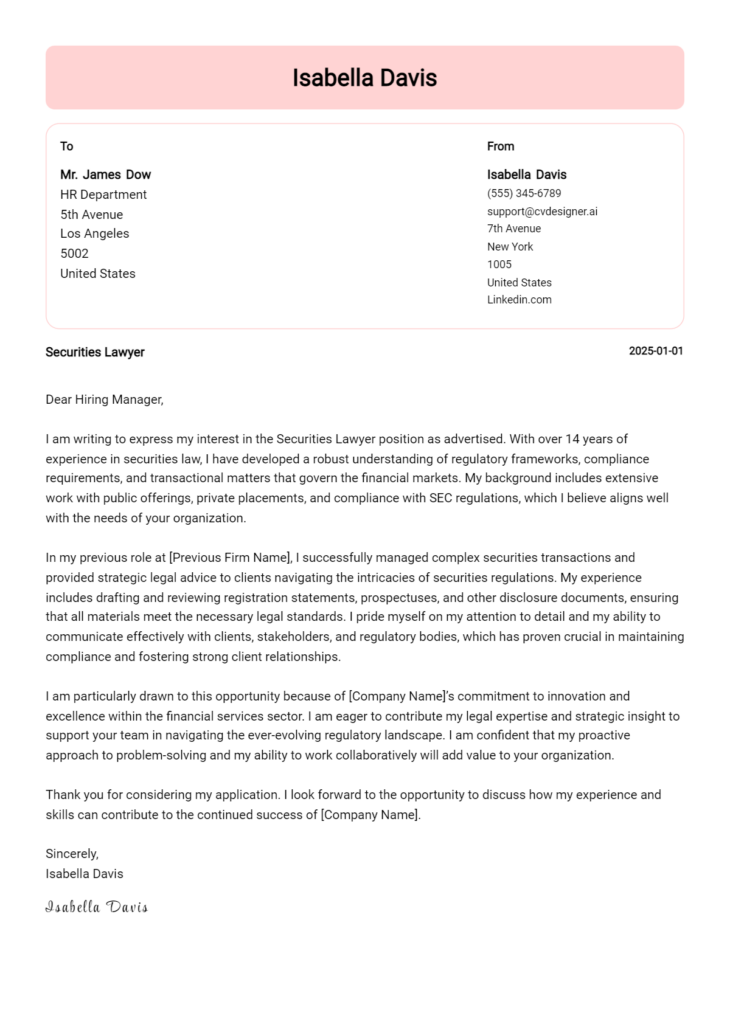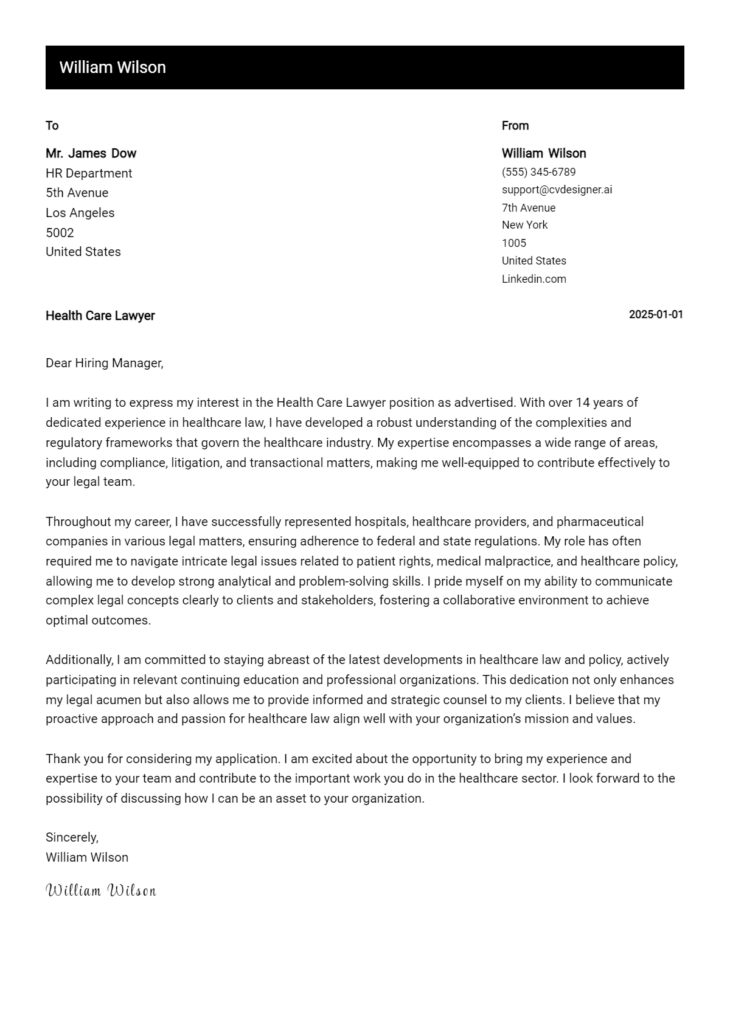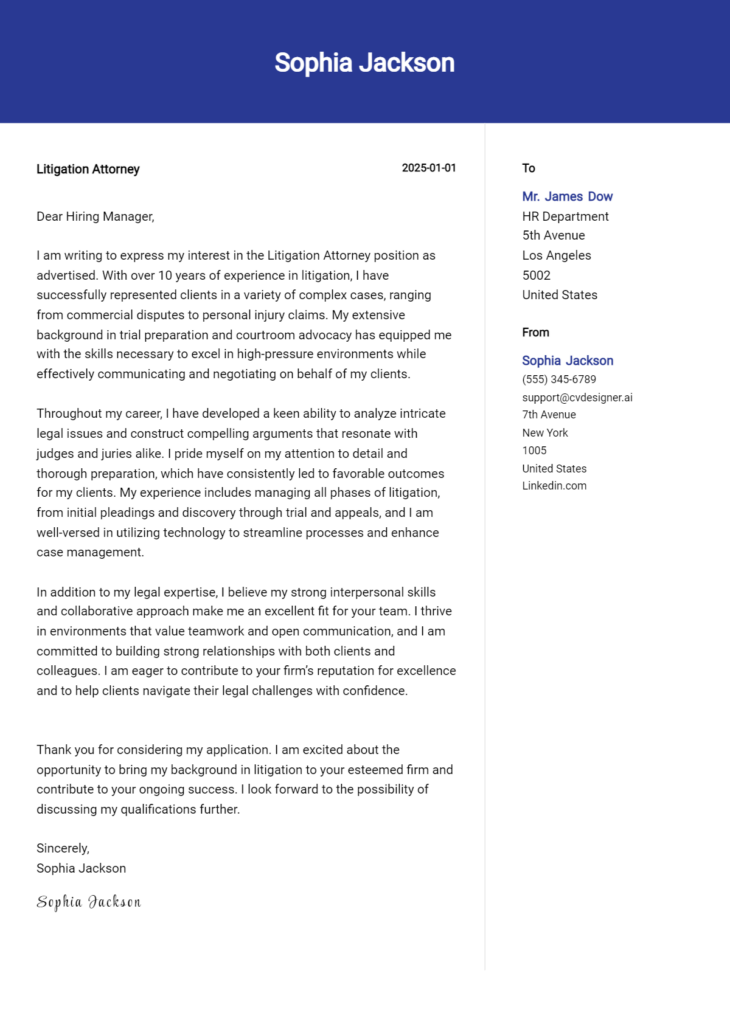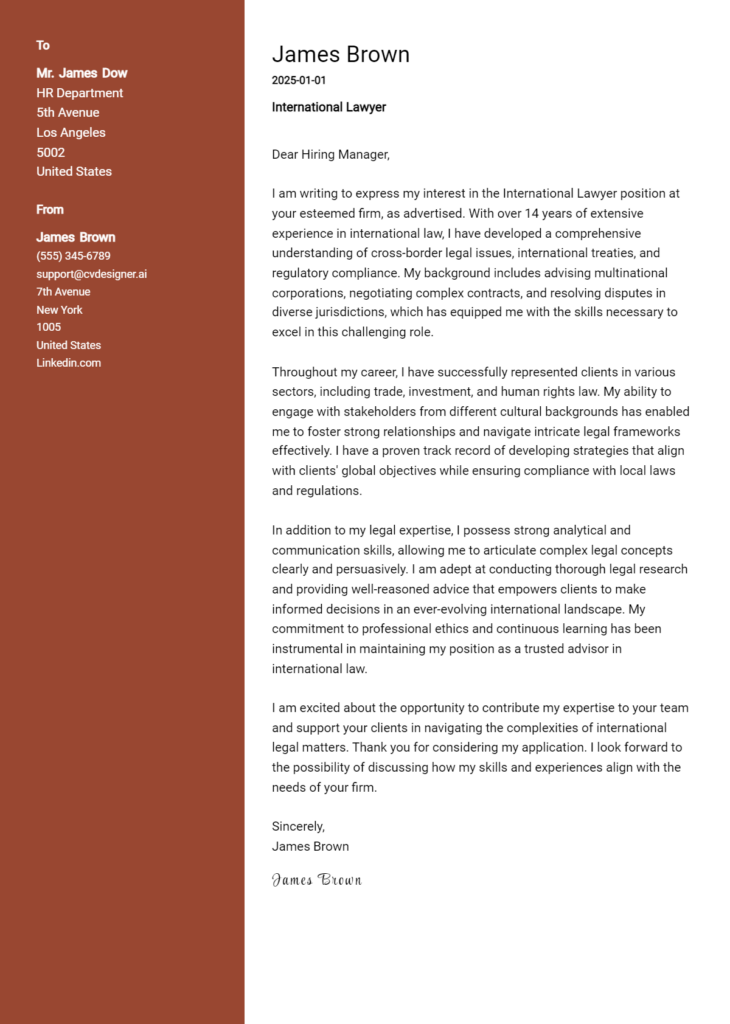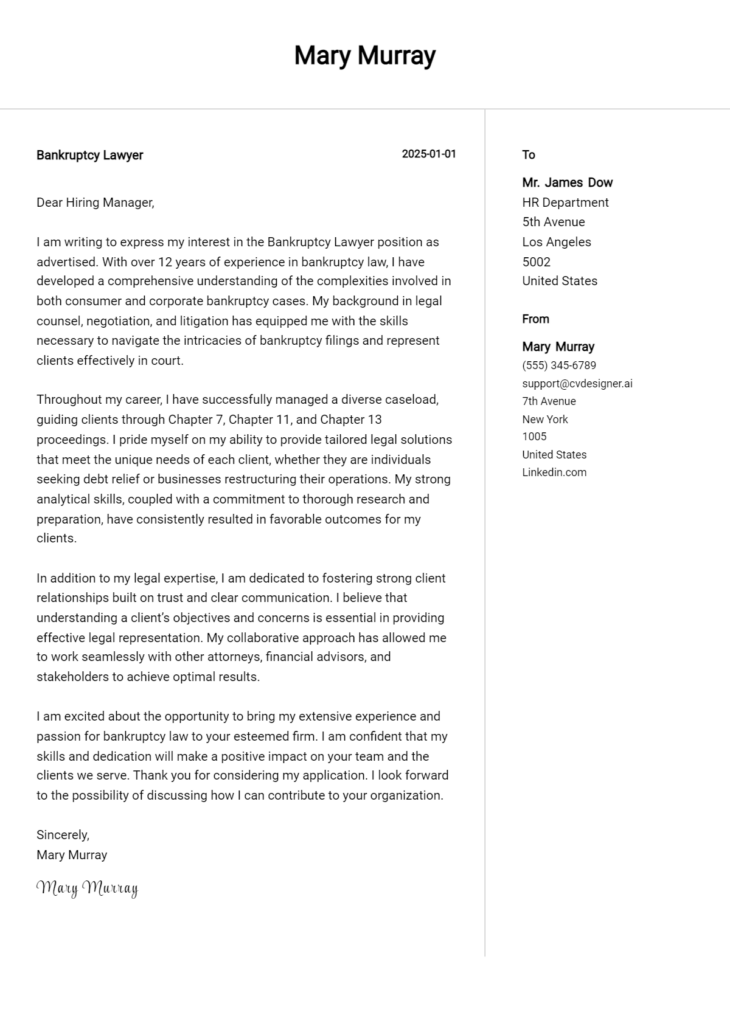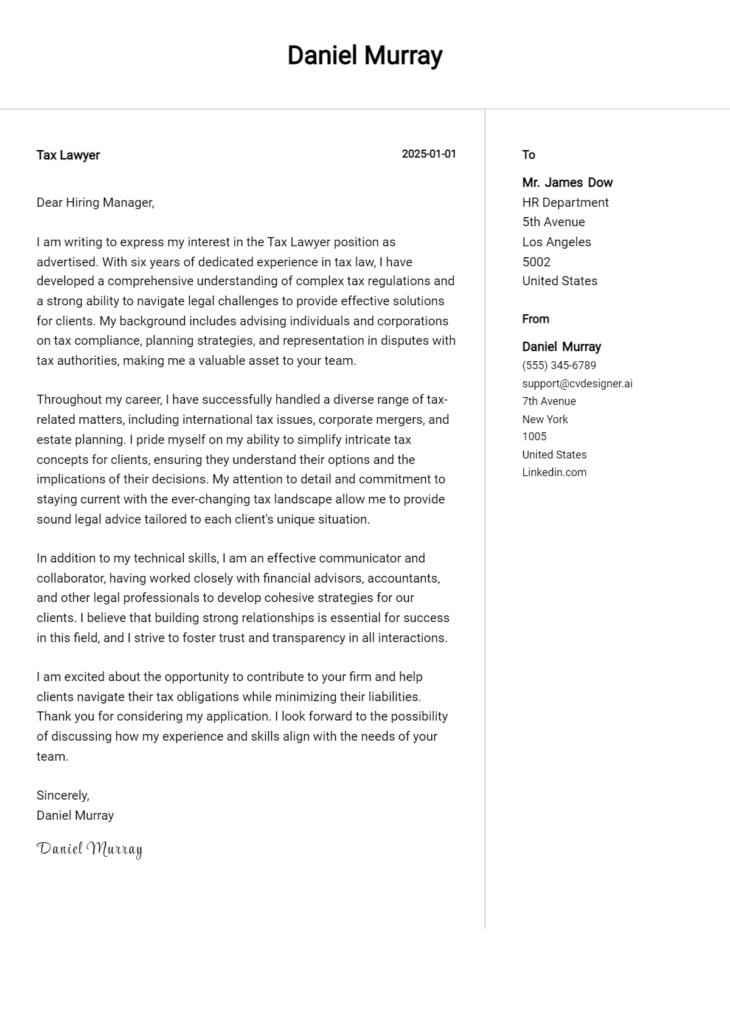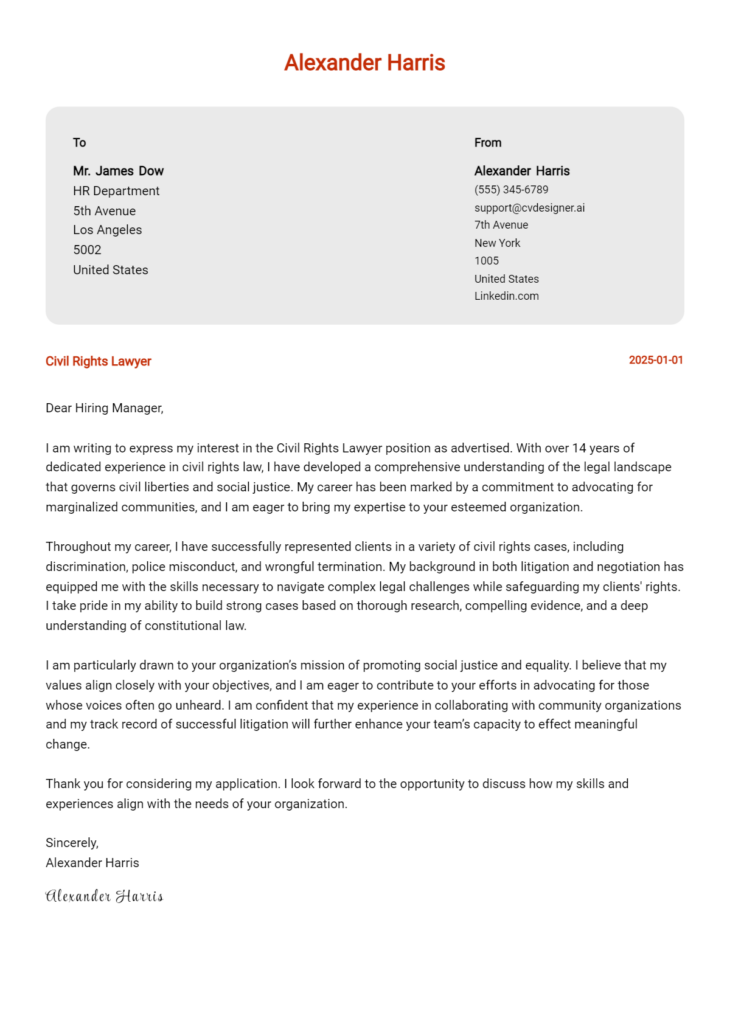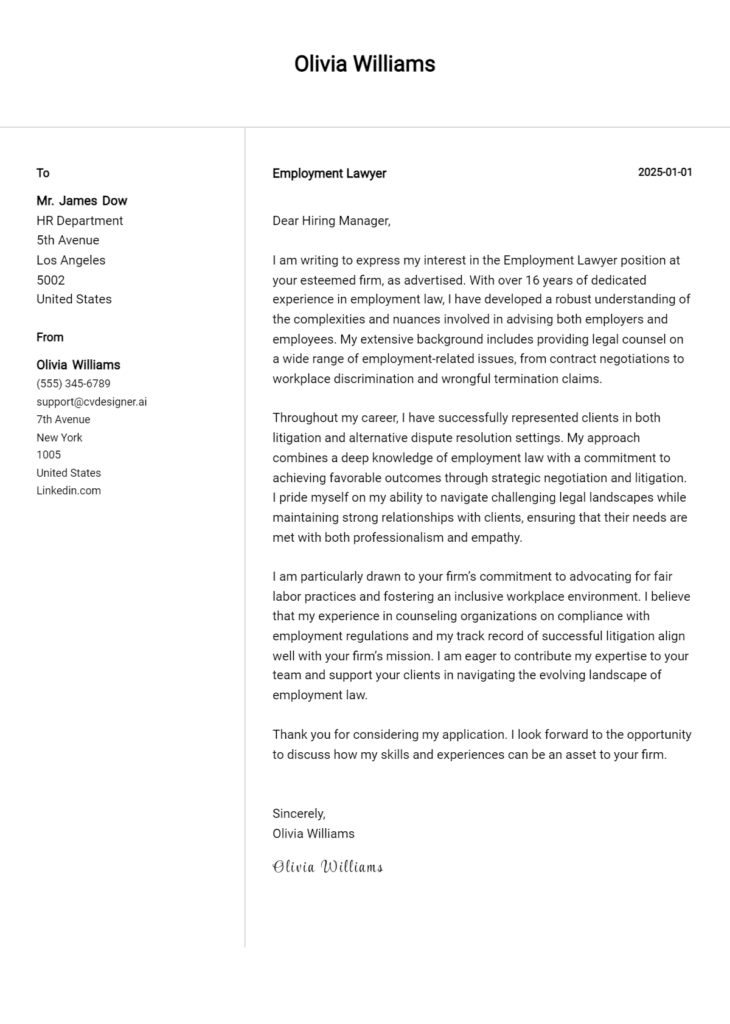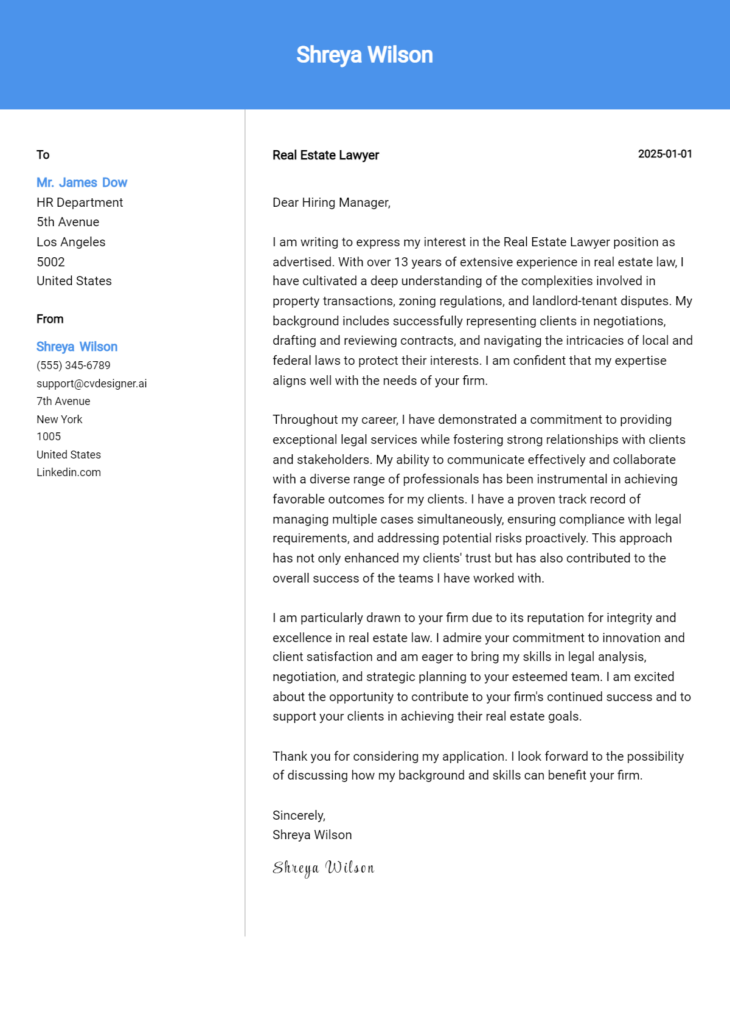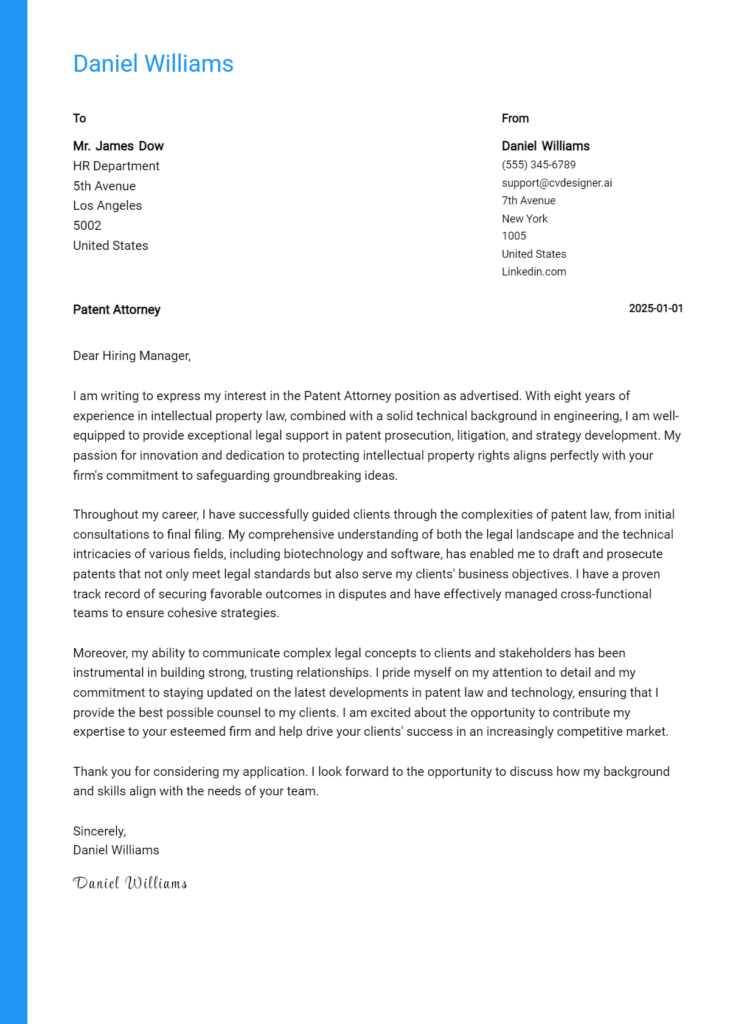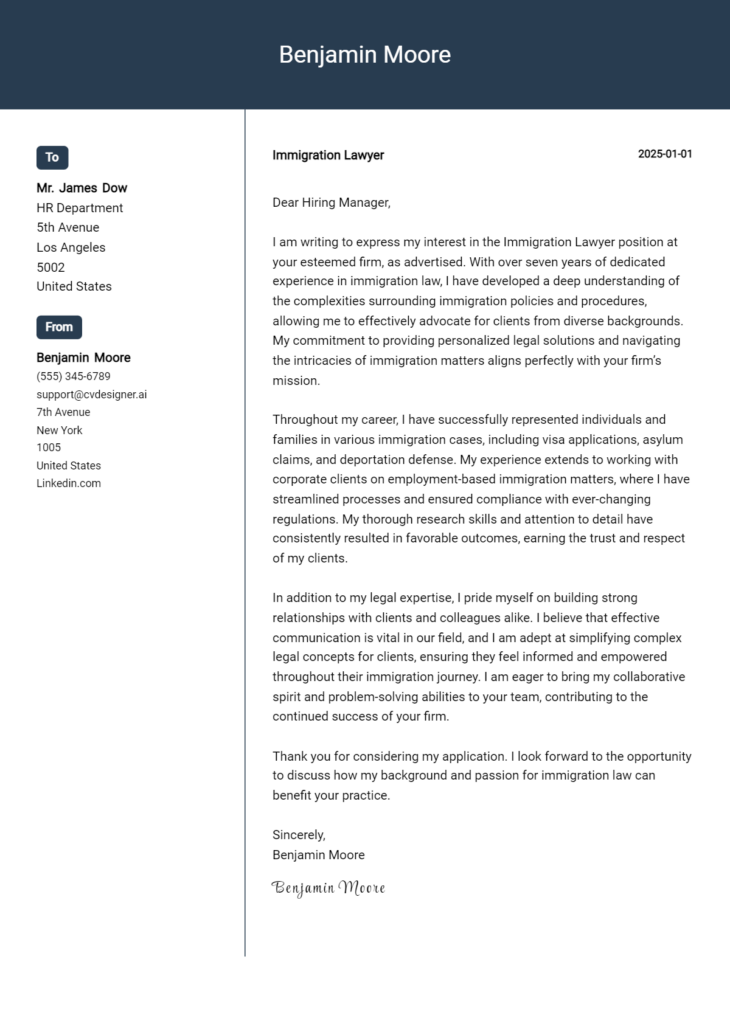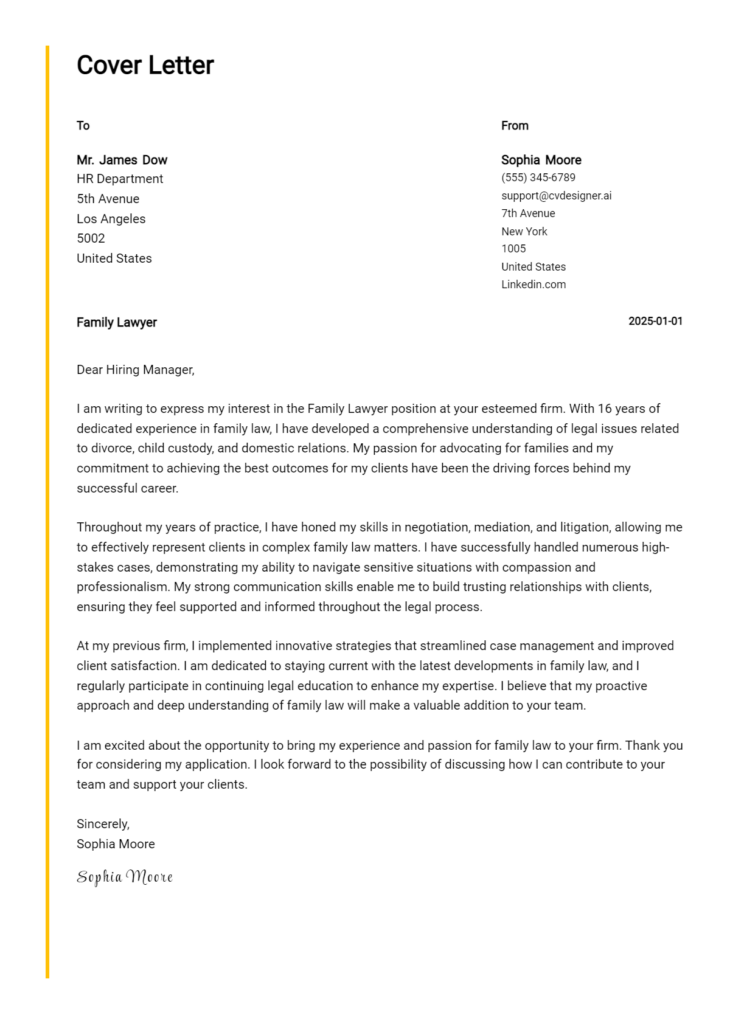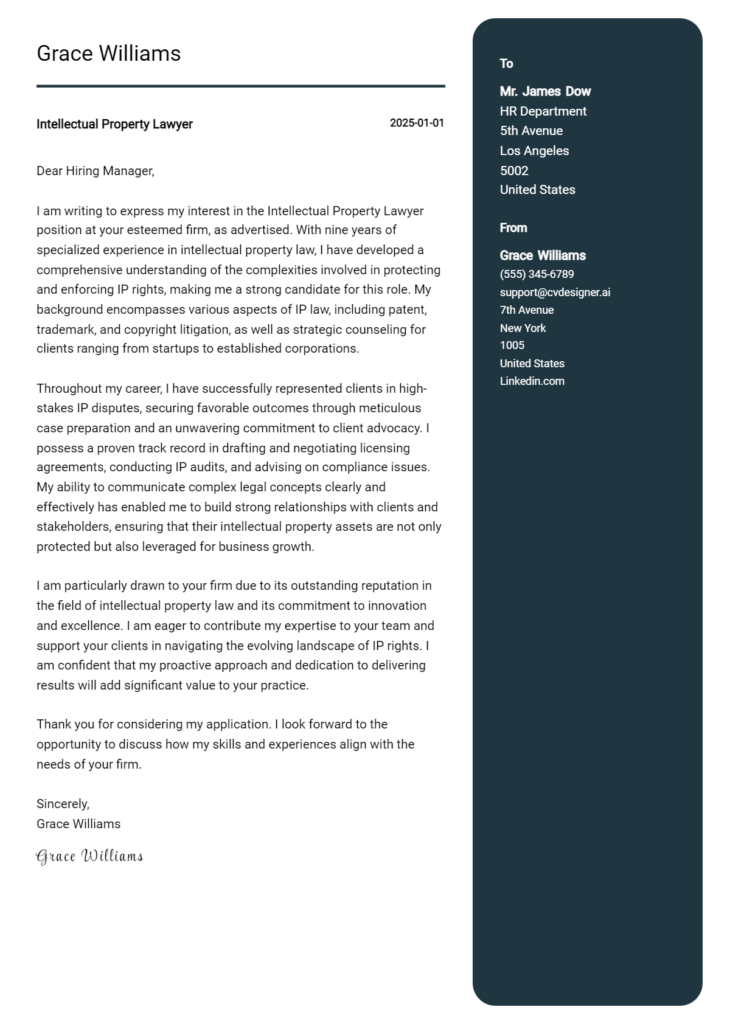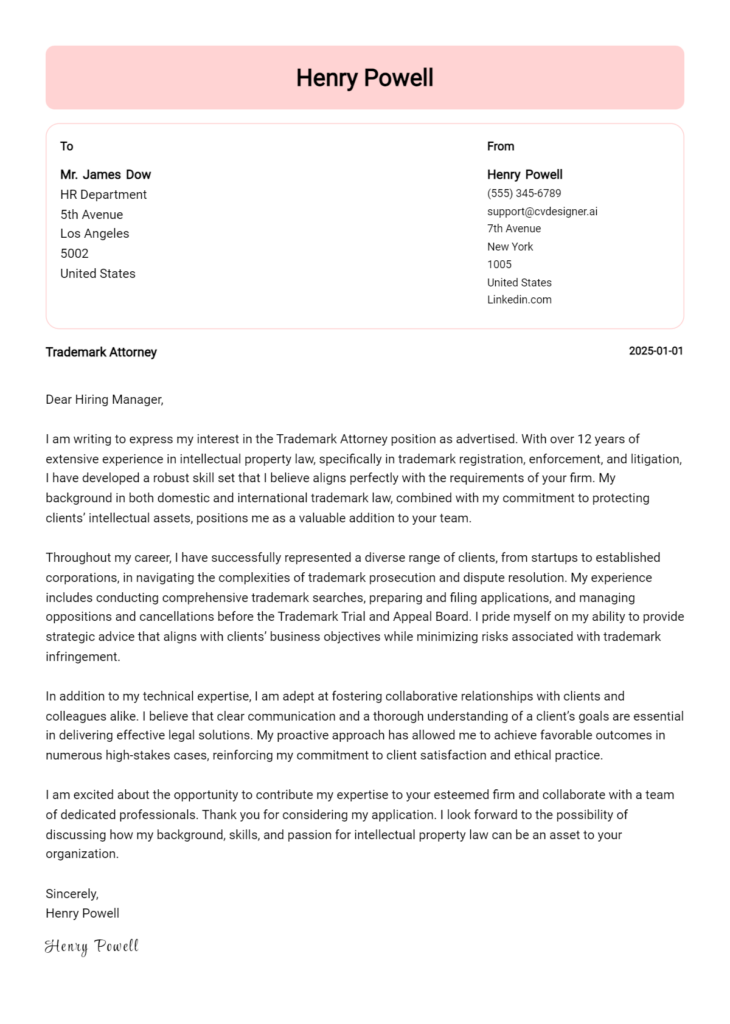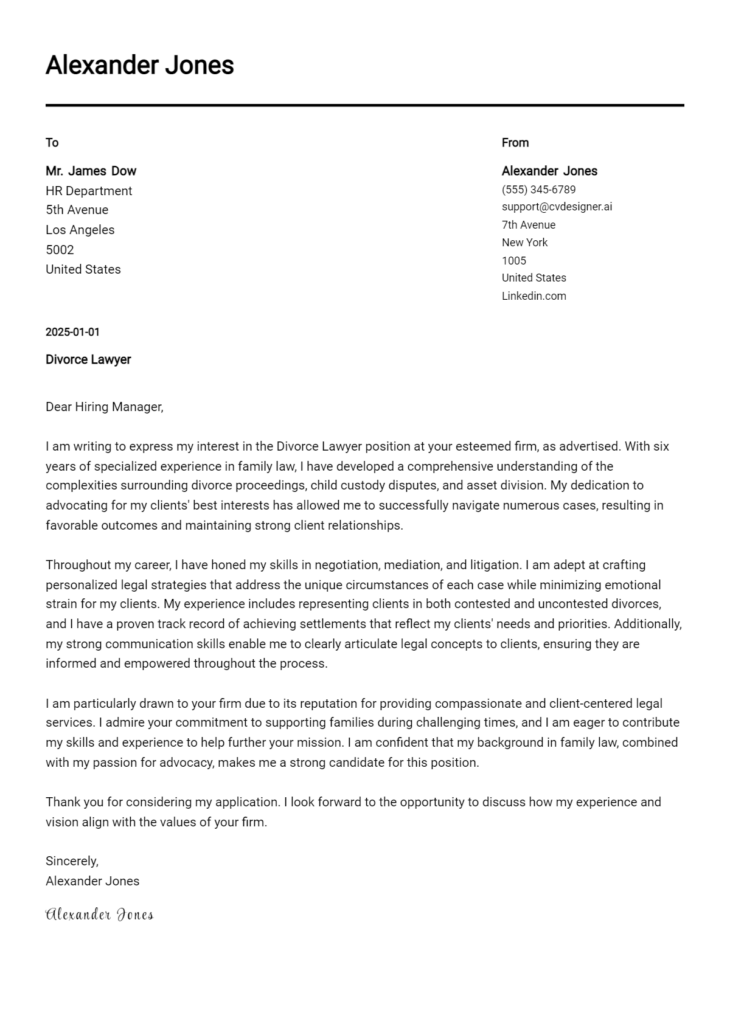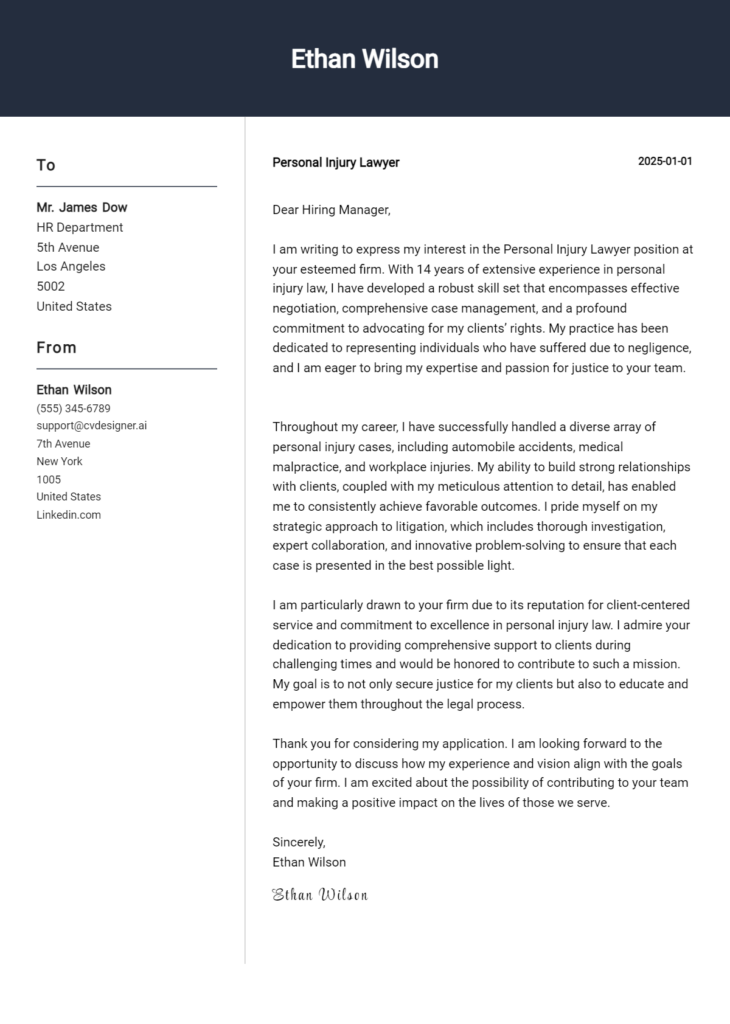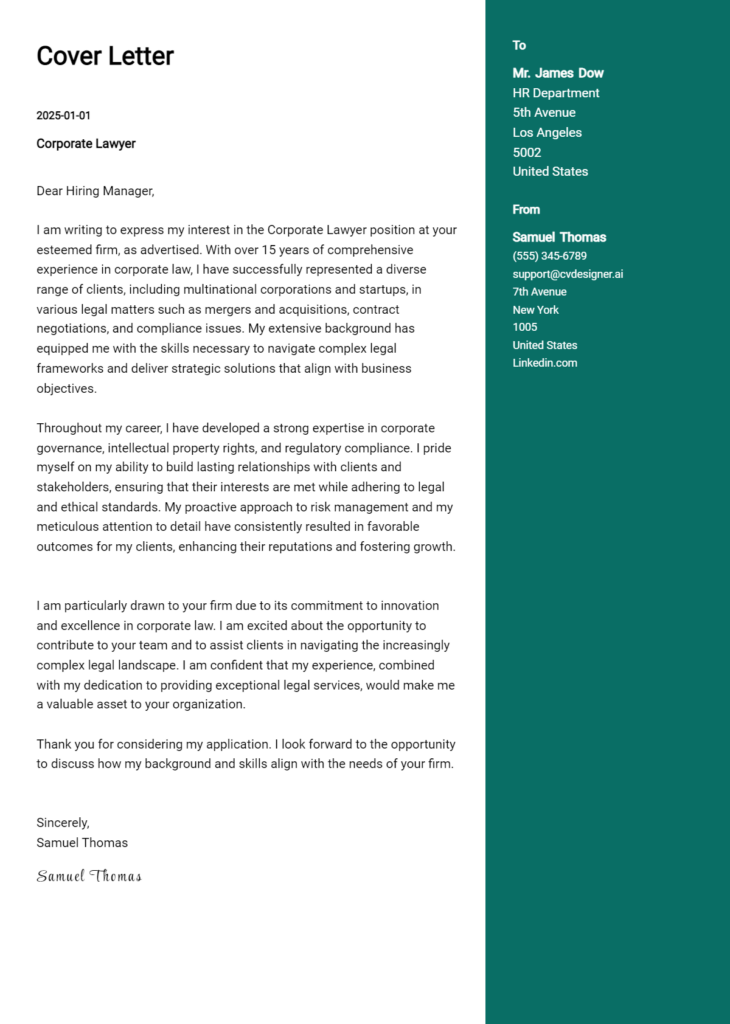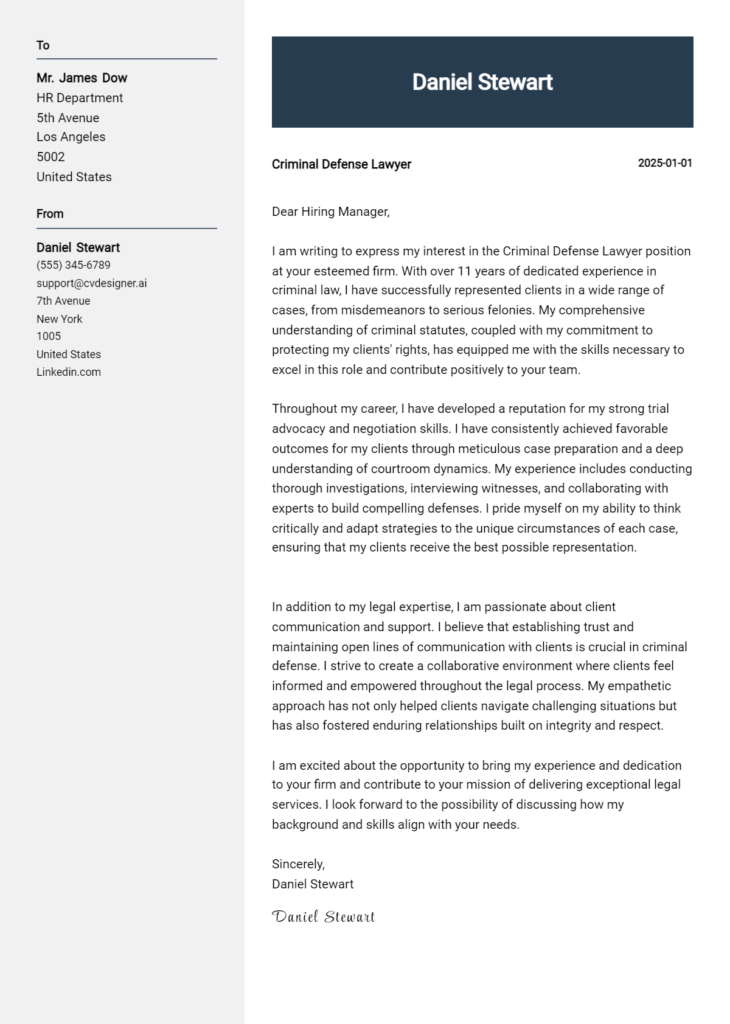Construction Lawyer Cover Letter Examples
Explore additional Construction Lawyer cover letter samples and guides and see what works for your level of experience or role.
How to Format a Construction Lawyer Cover Letter?
Crafting a compelling cover letter is essential for a Construction Lawyer, as it serves not only as an introduction but also as a reflection of your legal acumen and attention to detail. In the construction industry, where contracts and regulations are intricate, your cover letter must convey your ability to navigate complex legal frameworks. Proper formatting not only enhances readability but also demonstrates your professionalism and commitment to the field. A well-structured cover letter can captivate hiring managers and set you apart from other candidates.
In this guide, we will outline the key components of a professional cover letter, including:
- Cover Letter Header
- Cover Letter Greeting
- Cover Letter Introduction
- Cover Letter Body
- Cover Letter Closing
Each section is crucial in showcasing your qualifications and expertise in construction law. Let’s delve into each part and explore how to make your cover letter shine in this competitive field.
Importance of the Cover Letter Header for a Construction Lawyer
The header of a cover letter is crucial as it sets the tone for the entire document and serves as the first impression to potential employers or clients. For a Construction Lawyer, clarity and professionalism in the header are essential, as they reflect the lawyer's attention to detail and organizational skills—key traits in the legal field. The header should include the lawyer's contact information, the date, and the recipient's details to ensure clear communication and easy reference. A well-structured header not only conveys professionalism but also provides essential information at a glance.
Strong Example
John Doe, Esq. 123 Legal Lane Lawtown, ST 12345 (123) 456-7890 johndoe@email.com October 1, 2023 Jane Smith, Hiring Manager Construction Law Firm 456 Builder Blvd Construct City, ST 67890
Weak Example
October 1, 2023 To Whom It May Concern
The Importance of a Cover Letter Greeting for a Construction Lawyer
The greeting in a cover letter serves as the first impression to the hiring manager and sets the tone for the entire correspondence. A well-crafted greeting demonstrates professionalism and shows that you have taken the time to personalize your application, which is crucial in a competitive field like construction law. By addressing the hiring manager directly, you establish a connection and convey your genuine interest in the position. To avoid sounding generic, it's important to research the recipient's name or title, ensuring that your greeting reflects both respect and attention to detail.
Strong Greeting Example
Dear Ms. Johnson,
Weak Greeting Example
To Whom It May Concern,
The Importance of a Strong Cover Letter Introduction for a Construction Lawyer
A well-crafted cover letter introduction is crucial for any job application, especially for a Construction Lawyer. This opening paragraph is your first opportunity to capture the hiring manager's attention, express your enthusiasm for the role, and highlight your key skills or achievements relevant to the position. An effective introduction not only sets the tone for the rest of your cover letter but also establishes your professional identity and demonstrates your understanding of the complexities involved in construction law. Below are examples of strong and weak cover letter introductions to illustrate how impactful a well-written introduction can be.
Strong Example
Dear [Hiring Manager's Name], I am excited to apply for the Construction Lawyer position at [Company Name], as advertised on [Job Board/Company Website]. With over seven years of specialized experience in construction law, I have successfully represented clients in complex contract negotiations and dispute resolutions, resulting in a 95% success rate in litigation. My deep understanding of the intricacies of construction projects and my commitment to providing strategic legal solutions align perfectly with [Company Name]'s mission to uphold industry standards and foster strong client relationships.
Weak Example
To Whom It May Concern, I am writing to apply for the Construction Lawyer position. I have some experience in law and think I could do well in this role. I am looking for a job and hope to be considered for this position.
Purpose of the Cover Letter Body for a Construction Lawyer
The cover letter body for a Construction Lawyer serves as a vital platform for the candidate to articulate their relevant skills, experiences, and potential value to the firm. This section should not only highlight the candidate’s legal expertise in construction law but also provide concrete examples of their accomplishments, such as successfully navigating complex contract negotiations or representing clients in high-stakes litigation. By detailing specific projects, the candidate can demonstrate their ability to manage risks, ensure compliance, and contribute to the overall success of construction initiatives. Effective cover letter content can differentiate a candidate from others, showcasing how their unique background aligns with the firm's needs.
Strong Example
Dear [Hiring Manager's Name], I am writing to express my interest in the Construction Lawyer position at [Company Name]. With over seven years of experience specializing in construction law, I have successfully represented numerous clients in high-value disputes, including a landmark case that resulted in a $5 million settlement for a contractor wrongfully terminated on a major infrastructure project. My background in drafting and negotiating construction contracts has led to significant cost savings for my clients, exemplified by my role in revising contract terms that reduced project delays by 25%. I am eager to bring my expertise in risk management and compliance to [Company Name], contributing to your reputation for excellence in the construction industry. Sincerely, [Your Name]
Weak Example
Dear [Hiring Manager's Name], I am interested in the Construction Lawyer position at [Company Name]. I have worked in law for a few years, and I think I would be a good fit. I have done some work related to construction law but not a lot. I can help with contracts and disputes. I believe I can be an asset to your team since I want to learn more about construction law. Best regards, [Your Name]
Importance of the Cover Letter Closing for a Construction Lawyer
The closing paragraph of a cover letter is crucial as it serves to summarize your qualifications, reiterate your enthusiasm for the position, and encourage the hiring manager to take the next steps, such as reviewing your resume or scheduling an interview. A strong closing leaves a lasting impression and reinforces your suitability for the role, while a weak closing can diminish the overall effectiveness of your application.
Strong Example
Thank you for considering my application for the Construction Lawyer position at [Company Name]. With my extensive experience in construction law, contract negotiation, and dispute resolution, I am eager to contribute to your team. I believe my proactive approach and dedication to client success align well with your firm's values. I look forward to the opportunity to discuss how my background and skills can benefit [Company Name]. Please feel free to reach out to schedule a convenient time for an interview. Thank you once again for your consideration.
Weak Example
I hope you look at my resume. I think I would be okay for the Construction Lawyer job. Let me know if you want to talk. Thanks.
Crafting an effective cover letter for a Construction Lawyer position is crucial in showcasing your qualifications, skills, and passion for the field. A well-written cover letter not only highlights your technical prowess and problem-solving abilities but also your understanding of the construction industry and commitment to teamwork and continuous learning. Here are some tips to help you create a compelling cover letter that stands out to potential employers.
Tips for Writing a Cover Letter as a Construction Lawyer
Highlight Your Technical Skills
Clearly outline your technical skills relevant to construction law, such as contract negotiation, litigation, and compliance. Use specific examples to demonstrate how these skills have contributed to successful project outcomes or resolved complex legal issues. This will show potential employers that you have the expertise they need.Showcase Your Problem-Solving Abilities
Construction law often involves navigating intricate legal challenges. Share anecdotes that illustrate your problem-solving capabilities, such as how you addressed disputes between contractors and clients or mitigated risks associated with project delays. This will convey your ability to think critically and adapt to changing circumstances.Demonstrate Your Knowledge of the SDLC
If applicable, mention your familiarity with the Software Development Life Cycle (SDLC) as it pertains to construction technology. Emphasizing your understanding of how legal frameworks interact with technological advancements in the industry can set you apart from other candidates.Emphasize Teamwork and Collaboration
Construction projects require collaboration among various stakeholders, including contractors, architects, and clients. Illustrate your experience working within multidisciplinary teams and how you fostered positive relationships to achieve project goals. This will show that you can be a valuable asset in a team-oriented environment.Express Your Passion for Continuous Learning
The construction industry is constantly evolving, and a commitment to continuous learning is essential. Mention any relevant certifications, workshops, or courses you have completed to stay updated with industry trends and legal practices. This demonstrates your dedication to professional growth and your readiness to adapt to new challenges.
By incorporating these tips into your cover letter, you can effectively communicate your qualifications and enthusiasm for a Construction Lawyer position. For more assistance, consider using cover letter templates or a cover letter builder to streamline the writing process.
Common Mistakes to Avoid in a Construction Lawyer Cover Letter
Avoiding common mistakes in a cover letter is crucial for success, especially in a specialized field like construction law. A well-crafted cover letter can set you apart from other candidates, while errors can hinder your chances of getting noticed. Here are some common mistakes to watch out for:
- Generic Content: Using a one-size-fits-all cover letter can make you appear uninterested. Tailor your letter to the specific law firm or position you're applying for.
- Ignoring Formatting: A poorly formatted cover letter can detract from your professionalism. Follow a clear cover letter format to ensure readability and organization.
- Lack of Specificity: Failing to highlight specific experiences related to construction law can weaken your application. Use examples to showcase your expertise and achievements in the field.
- Typos and Grammatical Errors: Mistakes in your cover letter can signal carelessness. Always proofread your document or ask a peer to review it before submission.
- Overly Lengthy Letters: A cover letter should be concise and to the point. Aim for a length of no longer than one page to maintain the reader's interest.
- Neglecting Personalization: Failing to address the letter to a specific person can make your application seem impersonal. Research the firm and find the appropriate contact to address your letter to.
- Missing a Call to Action: Not including a clear call to action can leave your letter feeling incomplete. Express your enthusiasm for the opportunity and indicate your desire for a follow-up conversation.
For further inspiration, check out these cover letter examples to help you craft an effective letter that stands out in the competitive field of construction law.
Cover Letter FAQs for Construction Lawyer
What should I include in my cover letter as a Construction Lawyer?
In your cover letter, you should include your legal qualifications, relevant experience in construction law, and any specialized knowledge of contract negotiation, dispute resolution, or regulatory compliance. Highlight specific projects or cases you've worked on that demonstrate your expertise in the construction industry. It’s also important to express your understanding of the unique challenges faced in construction law, such as project delays or liability issues. Lastly, tailor your cover letter to the firm or organization you're applying to by mentioning why you're a good fit for their specific needs and values.
How long should my cover letter be for a Construction Lawyer position?
Your cover letter should ideally be one page long, consisting of three to four concise paragraphs. This length allows you to provide enough detail about your qualifications and experience without overwhelming the reader. Aim for clarity and brevity: focus on your most relevant achievements and skills. Use clear headings and bullet points if necessary, but ensure that the overall layout remains professional and easy to read. Remember, hiring managers often have limited time, so make each sentence count.
Should I address the cover letter to a specific person?
Yes, addressing your cover letter to a specific person is strongly recommended. If possible, research the hiring manager's name or the head of the legal department at the firm. A personalized greeting, such as "Dear [Name]," makes a positive impression and shows that you've taken the time to learn about the organization. If you cannot find a name, a general greeting like "Dear Hiring Committee" is acceptable but less impactful. Personalization conveys your interest and attention to detail, qualities that are crucial in the legal field.
How can I demonstrate my knowledge of construction law in my cover letter?
You can demonstrate your knowledge of construction law by referencing specific legal principles, regulations, or landmark cases relevant to the construction industry. Mention your experience with contracts, compliance with local construction codes, or your role in resolving disputes between contractors and clients. Including metrics or outcomes from past experiences, such as successfully negotiating a contract or minimizing risk in a project, can further illustrate your expertise. Additionally, expressing familiarity with industry trends, such as sustainability practices or changes in construction regulations, can highlight your commitment to staying current in your field.
Build your Cover Letter in minutes
Use an AI-powered cover letter builder and have your letter done in 5 minutes. Just select your template and our software will guide you through the process.

